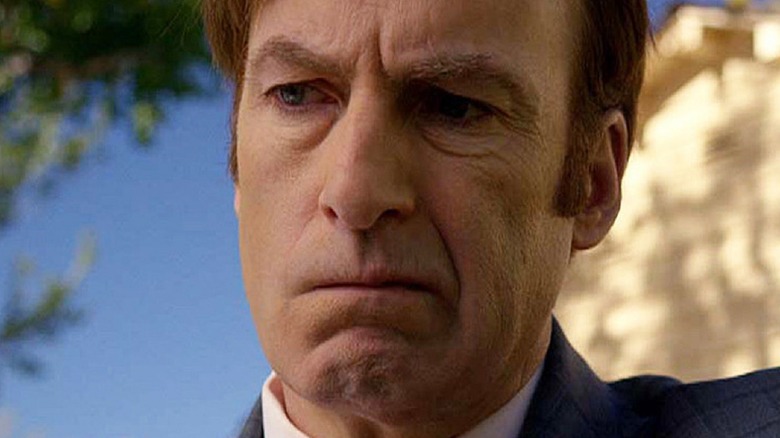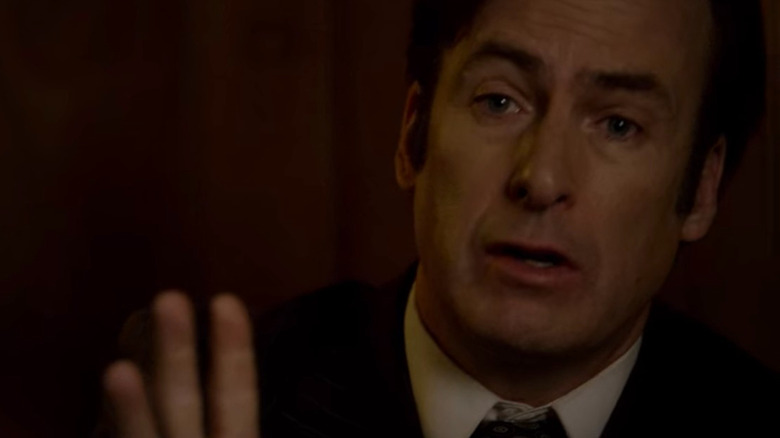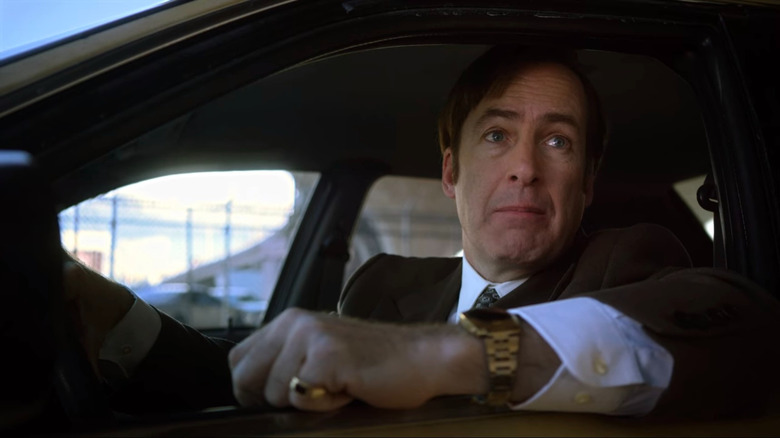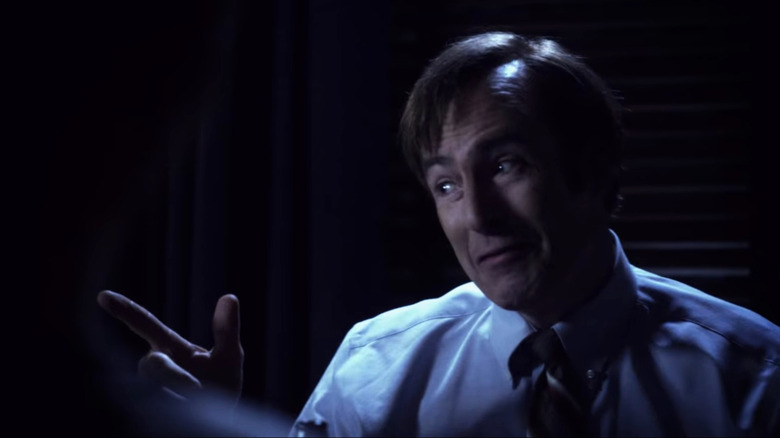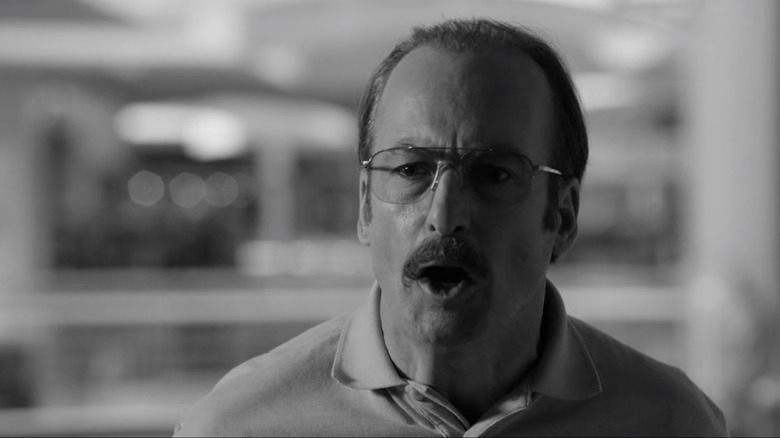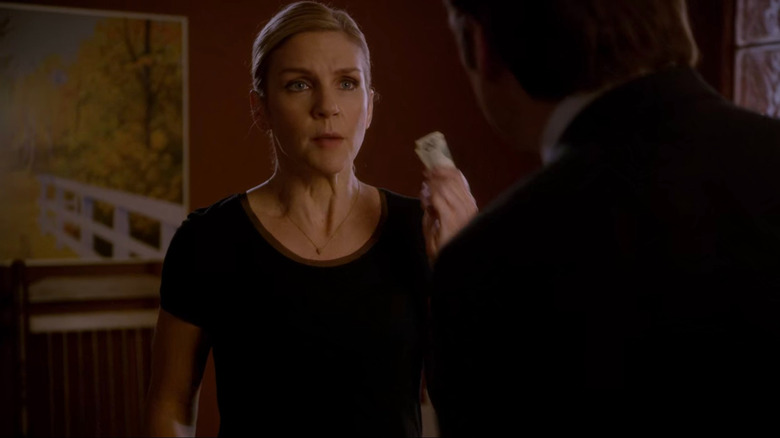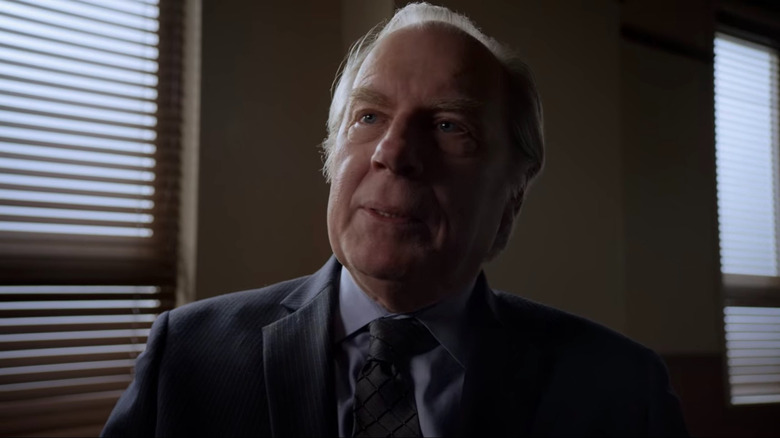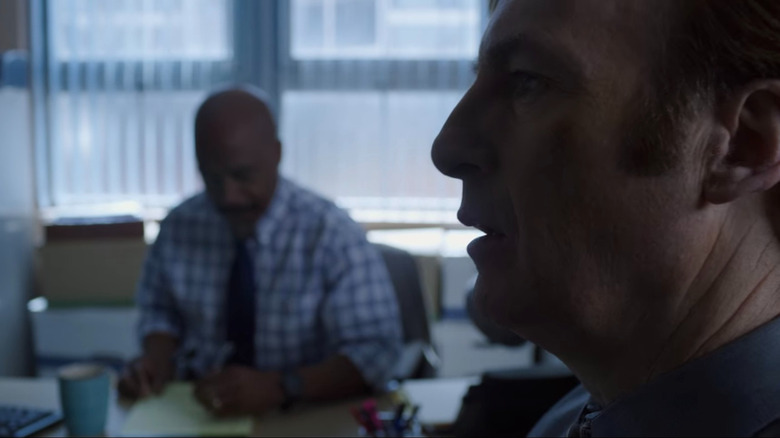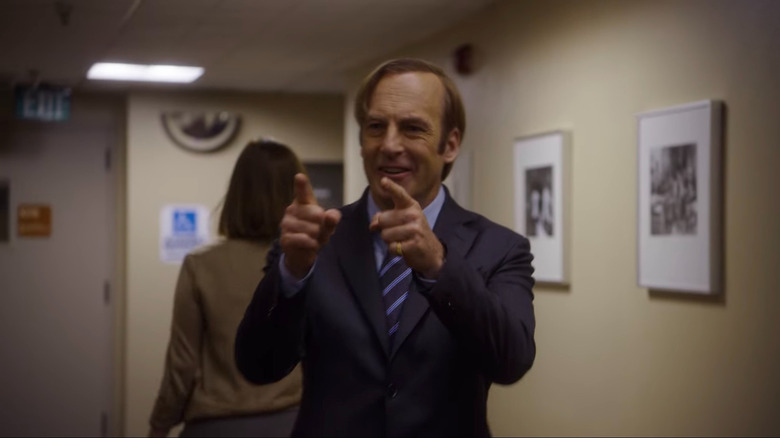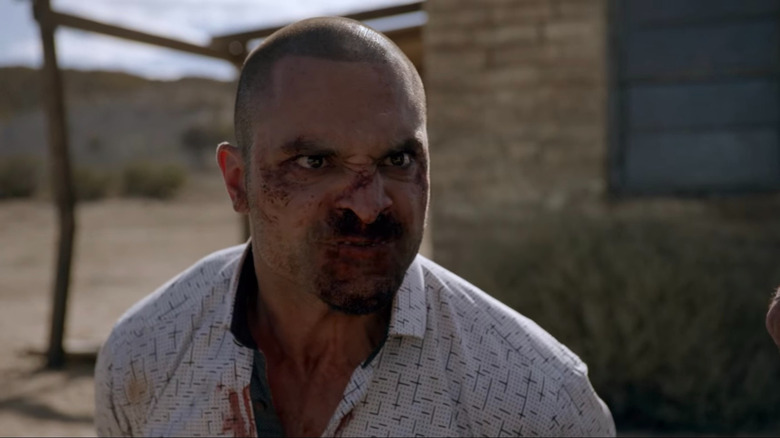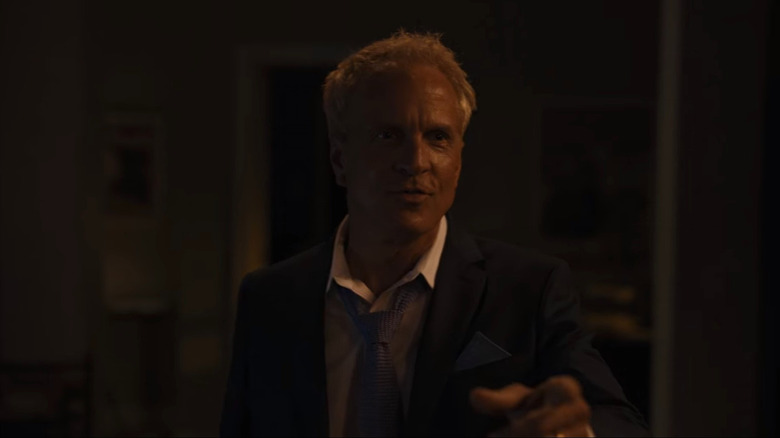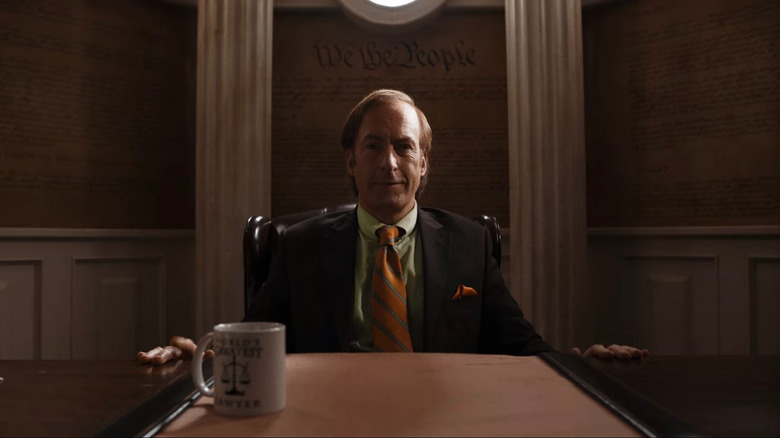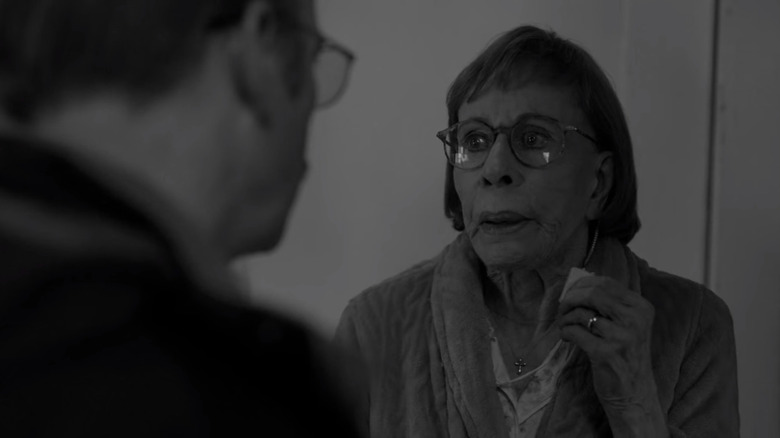Lines In Better Call Saul That Mean More Than You Realized
First introduced in Season 2 of "Breaking Bad," Bob Odenkirk's Saul Goodman — real name Jimmy McGill — quickly became a fan favorite character (as opposed to his brother Chuck). Since its debut in 2015, "Better Call Saul" has established itself as a great show in its own right. The spin-off series serves as a prequel to the events of "Breaking Bad" and as a vehicle for Odenkirk's character, Albuquerque's finest criminal lawyer. The series shows us exactly how Jimmy McGill went from a morally gray but well-intentioned lawyer to a full-blown criminal.
Aside from its stellar pacing and cinematography, the show's most integral element is its dialogue. Co-creators Vince Gilligan and Peter Gould have always had a knack for crafting excellent dialogue that can often mean different things, whether it foreshadows later events or informs a character's true nature. These are just a few notable examples of lines in "Better Call Saul" that mean more than you may have realized upon first viewing. Spoilers for "Breaking Bad" and "Better Call Saul" ahead.
This article contains mentions of suicide.
I'm a lawyer, not a criminal
Many lines in "Better Call Saul" play much differently if you've seen "Breaking Bad" in full. If you have, then the idea of Saul Goodman saying that he's not a criminal is the height of irony. Fans that jumped right from "Breaking Bad" into the (sometimes) superior "Better Call Saul" were no doubt delighted to see an immediate and intriguing callback. That callback comes in the form of an extended appearance from one of Walter White's first major obstacles, the drug kingpin Tuco Salamanca.
After attempting a scam involving two shady skater punks, Jimmy finds himself in Tuco's crosshairs. This results in some intense desert negotiations during which Jimmy — ever the fast talker — is able to (marginally) calm Tuco down. Jimmy and the skater punks make their exit, but the week is far from over for Mr. McGill. Jimmy happened to mention the sizable amount of money being held by the Kettlemans, which piqued the interest of Tuco's right hand man, Ignacio "Nacho" Vargas. Nacho decides to pay Jimmy a "finder's fee" for bringing this to his attention. "I'm a lawyer, not a criminal," Jimmy responds, politely declining Nacho's offer.
It's never stopping me again
Season 1 of "Better Call Saul" is fairly low stakes in the grand scheme of the show. However, it is still an essential part of the story and crucial to understanding the journey of Jimmy McGill. The debut season's main arc revolves around the Sandpiper Crossing class action lawsuit that Jimmy helps kick off. This lawsuit, which gets acquired by the big law firm Hamlin, Hamlin & McGill, would span the majority of the show's run.
When he finds out that his brother Chuck McGill told Howard Hamlin not to give him a chance at HHM, Jimmy feels betrayed. Compounding matters is the death of Jimmy's old partner in crime Marco, with whom he originally used the name Saul Goodman. When he returns to Albuquerque, Jimmy gets offered a spot on the Sandpiper outreach team after sympathizer Kim Wexler advocates for his presence. He's also offered a job with a rival law firm, but Jimmy gets cold feet and drives off, instead going to chat with Mike Ehrmantraut.
Jimmy's conversation with Mike marks a huge turning point in his life and career. The pair previously stole $1.6 million from the Kettlemans but decided not to keep it, instead doing the right thing. Why didn't they just keep it? "I know what stopped me," Jimmy says. "And you know what? It's never stopping me again." According to Odenkirk, the "it" he's talking about is "the approval of his brother." The actor told Variety: "It's accepting the judgment of other people on him. Looking outside of him for clues for what's right for you: Does it get the approval of the people around you, instead of does it resonate in your own heart?"
What's the difference between a tick and a lawyer?
This is a line that definitely takes on more significance as the series moves into its later seasons. The line in question is said during the fifth episode of Season 2, titled "Rebecca." The opening of the episode centers around the first meeting between Jimmy and Chuck's then-wife Rebecca, hence the title. It's no secret that Chuck doesn't have a particularly high opinion of his younger brother, so introducing his wife to Jimmy isn't the most appealing prospect. However, what actually occurs is far from what Chuck expects — Rebecca finds Jimmy utterly charming.
Ever the comedian, Jimmy makes a few corny jokes about lawyers which Rebecca even gets in on, much to Chuck's confusion. One of these jokes is, "What's the difference between a tick and a lawyer?," with the punchline being, "The tick falls off when he's dead." It's a funny line, but it's way darker after the events of the subsequent three seasons, with HHM heads Chuck and Howard both dead. Say what you will about Jimmy McGill, but the man can be quite prophetic and this is a prime example.
Say nothing, you understand? Get a lawyer!
At the beginning of every season of "Better Call Saul" (apart from Season 6) we get a glimpse into Saul's life after "Breaking Bad." Ed "The Disappearer" Galbraith sets him up with a new identity that will allow him to live a life of anonymity. This new identity is Gene Takovic, the humble manager of a Cinnabon located in a shopping mall in Omaha, Nebraska. In the first two seasons, the Gene segments contain very little in the way of major progression, but that all changes with Season 3. In the season opener, "Mabel," we see Gene enjoying what appears to be a standard lunch break until there's an unexpected interruption.
A young shoplifter bolts by Gene, dropping a stolen VHS tape before diving into a nearby photo booth to hide. Gene, not wanting to bring any attention to himself, quickly tells mall security where he is hiding, which results in his arrest. This clearly eats at Gene, who, despite fighting it like crazy, can't help but revert to old habits. He yells at the shoplifter: "Say nothing, you understand? Get a lawyer!" This is the first hint of Gene's old ways beginning to creep back up after being repressed for so long. It's a simple line, but Odenkirk sells it brilliantly.
Put a dollar in my pocket
The line between "Better Call Saul" and "Breaking Bad" blurred a little more with each passing season of the prequel show. More and more, characters and key bits of dialogue were sprinkled in by the writers. An early example of this came in the form of what some might consider to be a simple throwaway line. In the finale of "Better Call Saul" Season 2, Chuck captures Jimmy confessing to the Mesa Verde forgery on tape. Not only that, but Chuck goes to the trouble of making sure Jimmy finds out that he has been recorded. Kim, having received a heads up from her HHM co-worker Ernesto, passes the info to Jimmy — but not before safeguarding herself legally.
"Put a dollar in my pocket," Kim tells Jimmy. Why? Because, as soon as he does that, he's now her client and entitled to attorney-client privilege. If the line sounds familiar, that's because Saul himself said it during his first appearance in "Breaking Bad." This also resulted in the establishment of attorney-client privilege, which is ultimately beneficial in both scenarios. It's a great line and a fun little way of showing how Kim would influence Jimmy even after her eventual departure.
He'll never change
For many fans of "Better Call Saul," one of the show's best episodes is the Season 3 outing "Chicanery." This is the episode in which the ongoing feud between Jimmy and his older brother Chuck finally reaches a fever pitch. With Jimmy up for disbarment following his break in at Chuck's house, the figurative noose is tightening around his neck. To compound matters further, Chuck plans on taking the stand to testify against his own brother. But if there's one thing that Jimmy McGill knows how to do, it's play dirty.
With the help of Huell Babineaux, Jimmy finally manages to get the upper hand against his brother. Huell is able to plant a charged battery on Chuck, which should aggravate his supposed electrosensitivity. Jimmy, no longer willing to entertain his brother's delusion, successfully exposes Chuck's insanity for everyone — including Howard and Rebecca — to see. This causes Chuck to snap, dropping all decorum and spitting venom regarding his con artist brother. Among his comments is a simple one: "He'll never change." As awful as he is to his brother at times, Chuck isn't wrong about this, as subsequent seasons of "Better Call Saul" would prove.
I'm gonna be a damn good lawyer
The line "I'm gonna be a damn good lawyer" is yet another example of Jimmy McGill forecasting a future for himself that couldn't be further from his actual destination. Season 4 is one of the more pivotal seasons of "Better Call Saul," bridging the gap between the show's lighter era and the darker content of the latter years. It's the first season without Chuck McGill as a focal point (he commits suicide by setting his house on fire in Season 3). We also see Jimmy make ends meet as a cell phone store manager, until he sprinkles his standard Slippin' Jimmy magic on it. During his second PPD check in, Jimmy is asked what he will do once his twelve months have elapsed.
He responds to this by listing off a series of desires — a bigger office for him and Kim, and even more clients. He puts a stamp on this aggressively hopeful prediction for the future by saying, "I'm gonna be a damn good lawyer." The great irony here is that Jimmy achieves all of that eventually, but not in the way he intends and, sadly, not with Kim. Jimmy McGill does indeed become a great lawyer, but it's in service of all the wrong people and for all the wrong reasons.
It's all good, man
From the first episode, "Better Call Saul" viewers were curious about when Jimmy McGill would make his full transition to Saul Goodman. Over the course of four seasons we see Jimmy's moral alignment edge closer and closer to the crooked lawyer we saw in "Breaking Bad." The name Saul Goodman became Jimmy's alias for his side hustles during his twelve months away from the law. When the time comes, Jimmy is eager to impress the board at his appeal to practice law again. This involves not only a series of grand public gestures but an emotionally resonant speech at the appeal itself. Jimmy's speech — a fairly balanced summary of his difficult relationship with Chuck — does the trick, securing his return to law.
However, in a frankly loathsome display, Jimmy revels in how the board bought his untrue comments regarding Chuck. Kim, taken aback by how Jimmy's performance fooled even her, is knocked for a further loop by Jimmy's next action. Jimmy requests a DBA (Doing Business As) from a courthouse employee, noting that he doesn't want to use the name McGill anymore. Kim is shocked and confused, but Jimmy responds only with: "It's all good, man" — ending the season and effectively sealing Jimmy's fate. It's a tremendously executed moment, one that fans had been waiting for and one that hits even harder now.
For the rest of your life, you think of me
Nacho Varga was introduced in "Better Call Saul" Season 1 and slowly became a consistent fixture of the series. Portrayed by Michael Mando, the character was quickly embraced by fans, despite not being part of "Breaking Bad." One of the biggest questions heading into the show's final season was whether or not Nacho would survive. Credit as always to Gilligan and Gould, who kept us guessing up until Season 6, in which Nacho finally meets his end.
Nacho dies in the third episode of the season, "Rock and Hard Place," but not before getting the last laugh. With his back to the wall, at the mercy of Gus Fring and the Salamancas, Nacho makes his final stand. In a venom soaked tirade, he goes off on not only Gus Fring, but the entire Salamanca bloodline, admitting to betraying Lalo. However, Nacho isn't done — he also admits to Hector that his actions resulted in Hector's debilitating stroke. His tirade concludes with the line, "For the rest of your life, you think of me, you twisted f***!"
Rather than let Hector take his revenge, he takes his own life — Nacho had won, even in death. This recontextualizes much of Hector's behavior in "Breaking Bad." He's more than likely still fuming about his former underling outsmarting him.
You can't hide who you really are forever
The mid-season finale of "Better Call Saul" Season 6 left viewers reeling with its shocking final moments. The first half of Season 6 sees Jimmy and Kim's plan to take down Howard Hamlin finally come to fruition. In terms of steps, this is certainly a few notches higher than the typical Slippin' Jimmy (and Kimmy) scheme. They plan to ruin Howard's public image through a combination of planted drugs and doctored photos. Bit by bit these actions begin to destabilize Howard's life, all culminating in his complete breakdown at the Sandpiper Crossing mediation.
With all his colleagues now believing him to be a paranoid cocaine user, Howard drunkenly confronts Jimmy and Kim. Howard verbally tears into the couple, quite fairly criticizing them for their underhanded actions. He caps his totally justifiable tirade with his most heated comment, simply telling them: "You can't hide who you really are forever." This line rang more and more true as Season 6 progressed, with Jimmy fully succumbing to his Saul Goodman persona. Much like many great lines from the show's run, context is everything and this is definitely one that works on multiple levels.
Let justice be done, though the heavens fall
With the deaths of Howard Hamlin and Tuco Salamanca, the show's status quo was irrevocably rocked. In the aftermath, Jimmy and Kim attempt to return to their normal lives while dealing with PTSD. Following Howard's emotionally draining memorial service at the soon-to-be defunct HHM offices, Kim makes a choice. Not only does she quit being a lawyer all together, but she begins the process of packing her things to leave Jimmy. Following a devastating breakup conversation, Kim leaves Jimmy to stew in his regret as the scene cuts to black. We then fade into the morning routine of a fully realized Saul Goodman, complete with his signature comb over.
The show finally makes good on its premise in this moment, showing Saul as we knew him in "Breaking Bad." We are then shown an extended sequence of Saul jumping into his day, paying his escort and conversing with Francesca. Upon arriving at his garish, overly-patriotic strip mall office, Saul drops a familiar line before the episode concludes. He instructs Francesca to start the customer flow by saying "Let justice be done, though the heavens fall" — which is exactly what Chuck said back in Season 3's "Chicanery." This is a translation of a well-known Latin law term (Fiat justitia ruat caelum) that was famously used by Lord Mansfield in 1772 as he fought to free an accused slave. It's fitting that Chuck is referenced in some capacity during this scene, with Jimmy finally embracing who he really is.
I trusted you
The circumstances of Jimmy's ultimate undoing were speculated on at length during the run of "Better Call Saul." If you predicted that it would involve Carol Burnett and dial-up internet, you were spot on. After cozying up to Jeff the cab driver's mother Marion (Burnett), Jimmy — now going by Gene — introduces her to the internet. Following a botched scam, Jeff finds himself in jail facing charges. Gene informs Marion of this on the phone, mentioning a specific legal detail about Albuquerque in comparison to Nebraska. However, he previously told her that he had never been to Albuquerque, which caused her to do a little online research.
One AskJeeves search later and Gene walks in on Marion watching an old Saul Goodman advertisement on YouTube. Gene initially attempts to intimidate Marion, nearly yanking her LifeAlert necklace from her. Then, she utters three words to him: "I trusted you." For one, this is another sobering moment for Gene/Jimmy/Saul as, yet again, he has irreparably damaged a relationship through his dishonestly and inability to change. Also, the parallel of Jimmy hitting his legal stride with elder law only to be ultimately undone by a senior citizen is quite poetic. His downfall coming from the least likely of sources and through the simplest of errors is pitch perfect.
